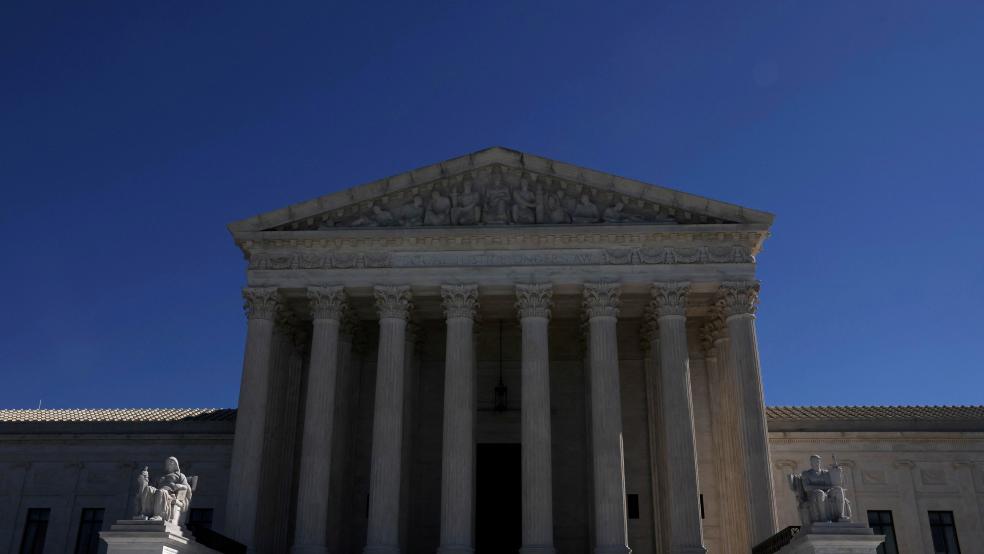The Supreme Court on Thursday limited the Environmental Protection Agency’s ability to curb power plant emissions, delivering a blow to the Biden administration efforts to combat climate change.
In one of the final opinions of the court’s 2021-22 term, the six conservative justices ruled that Congress had not clearly given the agency the authority to broadly regulate carbon emissions from power plants.
“Capping carbon dioxide emissions at a level that will force a nationwide transition away from the use of coal to generate electricity may be a sensible ‘solution to the crisis of the day,’” Chief Justice John Roberts wrote in the majority decision. “But it is not plausible that Congress gave EPA the authority to adopt on its own such a regulatory scheme … . A decision of such magnitude and consequence rests with Congress itself, or an agency acting pursuant to a clear delegation from that representative body.”
Republicans hailed the ruling as a victory against administrative bureaucracy while Democrats and environmentalists warned that it would have dire environmental and public health implications. President Joe Biden called the ruling “another devastating decision that aims to take our country backwards,” adding: “While this decision risks damaging our nation’s ability to keep our air clean and combat climate change, I will not relent in using my lawful authorities to protect public health and tackle the climate crisis.”
Here’s a rundown of some reactions:
Senate Majority Leader Chuck Schumer (D-NY): “The consequences of this decision will ripple across the entire federal government, from the regulation of food and drugs to our nation’s health care system, all of which will put American lives at risk, making it all the more imperative that Democrats soon pass meaningful legislation to address the climate crisis.” Mr. Schumer declared in a statement.
Senate Minority Leader Mitch McConnell (R-KY): “[T]he Court has undone illegal regulations issued by the EPA without any clear congressional authorization and confirmed that only the people’s representatives in Congress – not unelected, unaccountable bureaucrats – may write our nation’s laws. … The ruling also pushes back against the overbearing administrative state, which Democrats have expanded dramatically in recent years. The Constitution states clearly that the lawmaking process lies with the people and their elected representatives, not with opaque federal agencies. I am glad the Supreme Court affirmed this fact and hope other overeager bureaucrats take notice.”
Rep. Frank Pallone (D-NJ), chair of the House Energy and Commerce Committee: “Today’s decision makes a mockery of the clear separation of powers outlined in our Constitution and subverts decades of settled law. The Clean Air Act is emphatically clear that EPA has both the authority and the obligation to protect public health and regulate dangerous air pollution like greenhouse gases. The Supreme Court’s blatant dismissal of the will of Congress is an alarming display of hubris, the consequences of which will be felt far beyond this case.”
Sen. Shelley Moore Capito of West Virginia, the top Republican on the Senate Environment and Public Works Committee: “If Congress had intended to give EPA such sweeping authority to transform an entire sector of our economy, Congress would have done so explicitly. Today’s decision by the Supreme Court is welcome news and further proves that EPA overstepped its authority by imposing enormously burdensome regulations on states to reconfigure our electric grid despite Congress’s rejection.”
Sen. Ron Wyden (D-OR), chair of the Senate Finance Committee: “The Republicans on the Supreme Court are not going to allow any meaningful administration efforts to combat climate change. It’s crystal clear. The only way to tackle this problem is through congressional action, which is why it’s so important that Congress pas our clean energy tax credit package.”
The bottom line: “The Supreme Court’s ruling inevitably pushes the EPA to get creative, but the likely effect will be to push even more responsibility for cutting emissions to the states — where most of the action has been,” Bloomberg columnist Liam Denning writes. “Some states are doing yeoman’s work, but a fragmented approach means higher costs and slower progress.”





